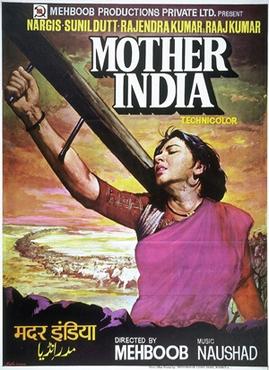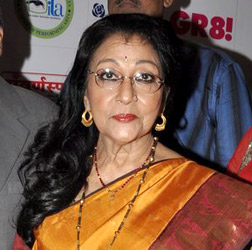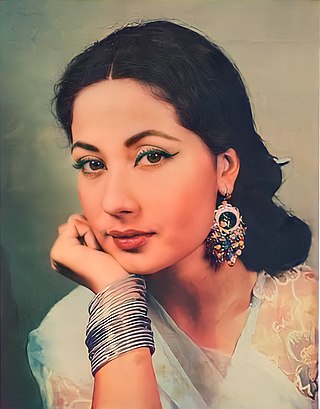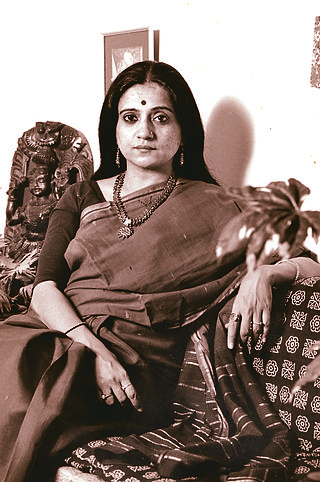Related Research Articles

Hindi cinema, popularly known as Bollywood and formerly as Bombay cinema, refers to the film industry based in Mumbai, engaged in production of motion pictures in Hindi language. The popular term Bollywood, is a portmanteau of "Bombay" and "Hollywood". The industry is a part of the larger Indian cinema, which also includes South Indian cinema and other smaller film industries.

Mother India is a 1957 Indian epic drama film, directed by Mehboob Khan and starring Nargis, Sunil Dutt, Rajendra Kumar and Raaj Kumar. A remake of Khan's earlier film Aurat (1940), it is the story of a poverty-stricken village woman named Radha (Nargis), who in the absence of her husband, struggles to raise her sons and survive against a cunning money-lender amidst many troubles.

Kishore Kumar was an Indian playback singer and actor. He is widely regarded as one of the greatest, most influential and dynamic singers in the history of Indian music. He was one of the most popular singers in the Indian subcontinent, notable for his yodeling and ability to sing songs in different voices. He used to sing in different genres but some of his rare compositions, considered classics, were lost in time. According to his brother and legendary actor Ashok Kumar, Kishore Kumar was successful as a singer because his "voice hits the mike, straight, at its most sensitive point".

Kumudlal Ganguly, better known by his stage name Ashok Kumar and also by Dadamoni, was an Indian actor who attained iconic status in Indian cinema. He was a member of the cinematic Ganguly family.

Mohammed Yusuf Khan, better known by his stage name Dilip Kumar, was an Indian actor who worked in Hindi cinema. Credited with pioneering method acting in cinema, he dominated the Indian movie scene from late 1940s throughout 1960s, being referred to as "Abhinay Samrat" by the audience. Kumar holds the record for most wins for the Filmfare Award for Best Actor and was also the inaugural recipient of the award. He holds the most dominant box-office record for a star in Hindi cinema with over eighty-percent box-office successes and several long-standing gross records.

Madhubala was an Indian actress and producer who worked in Hindi-language films. She ranked as one of the highest-paid entertainers in India in the post-independence era, that coincided with the rise of Indian cinema on global levels. In a career spanning more than 20 years, Madhubala was predominantly active for only a decade but had appeared in over 60 films by the time of her death in 1969.

Yash Raj Chopra was an Indian film director and film producer who worked in Hindi cinema. The founding chairman of the film production and distribution company Yash Raj Films, Chopra was the recipient of several awards, including 6 National Film Awards and 8 Filmfare Awards. He is considered among the best Indian filmmakers, particularly known and admired for his heroine based romantic films. For his contributions to film, the Government of India honoured him with the Dadasaheb Phalke Award in 2001, and the Padma Bhushan in 2005. In 2006, British Academy of Film and Television Arts presented him with a lifetime membership, making him the first Indian to receive the honour.

Alda Sinha, better known by her stage name Mala Sinha is a former Indian actress who has worked in Hindi, Bengali and Nepali films. Initially starting her career with regional cinema, she went on to become a top leading actress in Hindi Cinema in the late 1950s, 1960s and early 1970s. In a career spanning four decades, Mala Sinha rose to prominence with films like Guru Dutt's Pyaasa (1957) and Yash Chopra's Dhool Ka Phool (1959). Later, she starred in over hundred film productions including Phir Subah Hogi (1958), Hariyali Aur Rasta, Anpadh, Dil Tera Deewana (1962), Gumrah, Bahurani, Jahan Ara (1964), Himalay Ki God Mein (1965), Aasra (1966), Ankhen, Do Kaliyan and Maryada (1971). She was known as the "daring diva" and "torch bearer of women's cinema" for essaying strong female centric and unconventional roles in a range of movies considered ahead of their times. Having received multiple awards and nominations, she was given the Filmfare Lifetime Achievement Award in 2018.

Penmetsa Ram Gopal Varma, often referred to by his initials RGV, is an Indian film director, screenwriter and producer, known for his works in Telugu cinema in addition to Hindi, Kannada language films, and television. Varma has directed films across multiple genres, including parallel cinema and docudrama noted for their gritty realism, technical finesse, and craft. Regarded as one of the pioneers of new age Indian cinema, he was featured in the BBC World series Bollywood Bosses in 2004. In 2006, Grady Hendrix of Film Comment, published by the Film Society of Lincoln Center cited Varma as "Bombay's Most Successful Maverick" for his works on experimental films.

Pran Krishan Sikand, better known by his mononym, Pran, was an Indian actor, known as the greatest villain ever in the history of Indian cinema and character actor in Hindi cinema from the 1940s to the 1990s. He was one of the most highly successful & respected veteran actors in the history of Indian cinema. He was also one among the highest paid actors of his time.

Rahul Bose is an Indian actor, director, screenwriter, and social activist. Bose has appeared in Bengali films such as Mr. and Mrs. Iyer, Kalpurush, Anuranan, Antaheen, Laptop and The Japanese Wife. He has also appeared in Hindi films such as Pyaar Ke Side Effects, Maan Gaye Mughal-e-Azam, Jhankaar Beats, Kucch Luv Jaisaa, Dil Dhadakne Do, Chameli and Shaurya. He also played the antagonist in the Tamil thriller Vishwaroopam (2013) and its sequel. Time magazine named him "the superstar of Indian arthouse cinema" while Maxim named him "the Sean Penn of Oriental cinema" for his work in parallel cinema films like English, August and Mr. and Mrs. Iyer. He is also notable for his social activism: he participated in the relief efforts that followed the 2004 Boxing Day tsunami and is also the founder of the anti-discrimination NGO, The Foundation.

Meena Kumari was an Indian actress and poet, who worked in Hindi films. Popularly known as The Tragedy Queen, she was active between 1939 and 1972. Kumari is widely considered one of the greatest actresses of Indian cinema. In a career spanning 33 years, from child actress to adult, she starred in over 90 films before dying, at 38, from cirrhosis of the liver associated with her alcoholism.

Harikrishan Goswami, better known by his screen name Manoj Kumar, is an Indian actor, filmmaker, screenwriter, lyricist and editor who worked in Hindi cinema. He is known for acting and making films with patriotic themes, and has been given the nickname Bharat Kumar. He is the recipient of a National Film Award and seven Filmfare Awards, in varied categories.

Ganga Jamna, also transliterated as Ganga Jamuna or Gunga Jumna, is a 1961 Indian crime drama film, written and produced by Dilip Kumar, and directed by Nitin Bose, with dialogues written by Wajahat Mirza; Kumar later said that he also ghost-directed and edited the film. It stars Dilip Kumar with Vyjayanthimala and his real-life brother Nasir Khan in the leading roles. Set in the rural Awadh region of Northern India, the film tells the story of two impoverished brothers, Ganga and Jamna, and their poignancy and sibling rivalry on opposing sides of the law, one a dacoit criminal and the other a police officer. The film was also notable for its Technicolor production, use of the Awadhi dialect, and its rustic setting, being a defining example of the dacoit film genre. It was ranked 11th in Outlook Magazine's poll considering 25 leading Indian directors' vote for Bollywood's greatest films in 2003.

Vyjayanthimala is a former Indian actress, dancer and parliamentarian. She is the recipient of several accolades, including two BFJA Awards and five Filmfare Awards. She made her screen debut at the age of thirteen with the Tamil film Vaazhkai (1949), and followed this with a role in the Telugu film Jeevitham (1950). Her first work in Hindi cinema was the social guidance film Bahar (1951), which she headlined, and achieved her breakthrough with the romantic film Nagin (1954).

The Ganguly family in Bollywood is referred as the Hindu Bengali Brahmin family hailing from Madhya Pradesh.
Screen was an Indian weekly film magazine published by Indian Express Limited. Established in 1951, it was owned by The Indian Express Group. The magazine was acquired by Star India in 2015 and subsequently ceased publication.

Sampooran Singh Kalra, known professionally as Gulzar, is an Indian Urdu poet, lyricist, author, screenwriter, and film director known for his works in Hindi cinema. He is regarded as one of greatest Urdu poets of this era. He started his career with music director S.D. Burman as a lyricist in the 1963 film Bandini and worked with many music directors including R. D. Burman, Salil Chowdhury, Vishal Bhardwaj and A. R. Rahman. Gulzar also writes poetry, dialogues and scripts. He directed films such as Aandhi and Mausam during the 1970s and the TV series Mirza Ghalib in the 1980s. He also directed Kirdaar in 1993.
Shabbash Daddy is a 1979 Bollywood film directed, produced, written & starred by Kishore Kumar, also stars Yogeeta Bali, Amit Kumar, Jaya Sudha in lead roles. The film was one of several collaborations between Kishore Kumar and his real-life son Amit, where the two played a father and son. The film did not get notice.

Bhawana Somaaya is an Indian film journalist, critic, author and historian. She has been honoured with the Padma Shri in the year 2017 by the President of India Pranab Mukherjee. Starting her career as film reporter in 1978, she went to work with several film magazines, through the 1980s and 1990s. Eventually, she remained editor of Screen, a leading film magazine, from 2000 to 2007. She has written over 13 books on history of Hindi cinema and biographies of Bollywood stars, including Salaam Bollywood (2000), The Story So Far (2003) and her trilogy, Amitabh Bachchan – The Legend (1999), Bachchanalia – The Films And Memorabilia of Amitabh Bachchan (2009) and Amitabh Lexicon (2011).
References
- ↑ ApunKaChoice Bureau (13 August 2004). "'Kishore Kumar had 'method' in his madness". Archived from the original on 22 August 2009. Retrieved 26 February 2008.
- ↑ "Paperback Pickings". The Telegraph. 22 July 2005. Archived from the original on 3 February 2013. Retrieved 26 February 2008.
- ↑ Rana Siddiqui (11 April 2007). "Writing it Right". The Hindu . Archived from the original on 3 November 2007. Retrieved 26 February 2008.
- ↑ Rachna Singh (25 February 2007). "Integrated Solutions". The Sunday Tribune. Retrieved 26 February 2008.
- ↑ "India's Film Industry Will Have to Turn Serious". The Hindu. 18 December 2006. Retrieved 26 February 2008.[ dead link ]